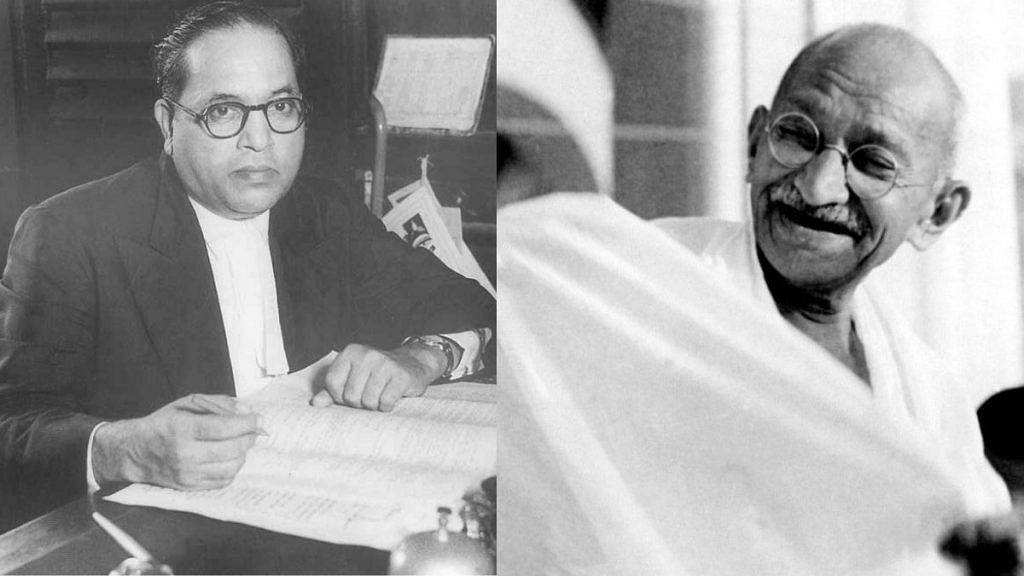The careers of M.K. Gandhi, B.R. Ambedkar and K.B. Hedgewar took off in the same decades, but they had very few attributes in common. They shared almost two decades of public life and started their journey in the undivided state of Bombay. But surprisingly, Gandhi and Ambedkar almost ignored the presence of Hedgewar and the organisation he founded, the RSS.
Gandhi took the helm of affairs of Congress in 1920 — the year Congress started the non-cooperation movement, side-lining an array of towering leaders including B.G. Tilak, M.M. Malviya, C.R. Das and others. Three years prior, in 1917, Ambedkar got his first thesis titled ‘Castes in India’ published. By 1925, Ambedkar had emerged as the sole voice of the oppressed classes, and in 1932, he attended the Second Roundtable Conference in that capacity.
Hedgewar, then a Congress worker from Nagpur, left the freedom movement and founded the RSS in 1925. So, there were at least 15 years of overlapping in the public life of these personalities, before Hedgewar died in 1940. Gandhi and Ambedkar did not engage with the RSS even when Golwalkar became the RSS chief.
Also read: Mahatma Gandhi is arriving shortly
It can’t be attributed to just disagreements.
Despite disagreeing on many issues, Gandhi and Ambedkar continuously engaged with each other through various platforms. Gandhi and Ambedkar had different takes on the social reform movement and it was their main bone of contention. Still, they kept meeting and wrote long letters to each other, mostly to register their disagreement. Ambedkar argued that social reforms should precede political freedom whereas Gandhi’s argument was that India should first attain freedom and social issues can be resolved later on.
There was only one instance of Gandhi meeting Hedgewar, in 1934, and Gandhi rejected the idea of RSS summarily. Similarly, Ambedkar only once met a delegation of Hedgewar, Golwalkar and Savarkar, but rejected the idea of a Hindu Rashtra. The level of their disengagement was such that it’s hard to find even the name of Hedgewar in the 21 volumes of the writings and speeches of Ambedkar.
Also read: How Gandhi made Ambedkar a villain in his fight to be the real representative of Dalits
BJP’s plan to co-opt Gandhi & Ambedkar
Now, the BJP-RSS is trying to co-opt Gandhi and trying to pitch him against the Congress, but the same Gandhi never gave any importance to the RSS in his lifetime. He was an antithesis to whatever the RSS stood for on all public issues including nation-building, democracy, social reforms and secularism.
Today, after 71 years of all things Gandhi propagated, RSS-BJP only found cleanliness or swachhata as a legacy to co-opt. As if Gandhi had done nothing other than sweeping his ashram floors and cleaning his toilet in his entire life.
It seems that Gandhi and Ambedkar had a common itinerary, as far as nation-building is concerned, although they had different priorities. Whereas Hedgewar was charting an altogether different course of action – that of making Bharat into a Hindu Rashtra.
Before Gandhi returned to India, the Congress was a party of social and economic elites. Gandhi changed all that and had broad-based the freedom movement by inducting Muslims, farmers and Dalits in the Congress. The armchair politics of the Congress had to pave way for a mass movement involving lakhs of common men and women. A Bania Gandhi leading the freedom movement was not the idea of India envisaged by the likes of Chiplunkar, Tilak and their disciple Hedgewar. Soon after the demise of Tilak, Hedgewar left the Congress-led freedom struggle and started to organise the Hindus to regain the so-called past glory of Aryavarta.
Explaining this phenomenon, Ambedkar, in his treatise, Gandhi, Ranade and Jinnah, argued: “The intelligentsia was divided into two schools—a school which was orthodox in its belief but unpolitical in its outlook, and a school which was modern in its beliefs but primarily political in its aims and objects. The former was led by Mr Chiplunkar and the latter by Mr Tilak. Both combined against Ranade and created as many difficulties for him as they could.”
Tilak stood against all social reforms including empowerment of women, inter-caste marriages, increase in the age of consent, inclusion of farming communities and the underclass in public life, and so on and so forth. He imagined the past as glorious and even declared that if the British had not come to India, the Peshwas would be ruling the entire country. The RSS had a similar dream of making India great again. Gandhi and Ambedkar were of no use in this project as both were modernists as far as their political thoughts were concerned.
But democratic politics has its own exigencies and for the sake of it, the BJP-RSS is now trying to co-opt both Gandhi and Ambedkar in its scheme of things.
Also read: You can be a Hindu nationalist and an Ambedkarite both
A difficult task
For the BJP-RSS, Ambedkar is a difficult pill to swallow because he had an explicitly antithetical stance on the Hindu Rashtra. He unequivocally declared that, “If Hindu Raj does become a fact, it will, no doubt, be the greatest calamity for this country. No matter what the Hindus say, Hinduism is a menace to liberty, equality and fraternity. On that account it is incompatible with democracy. Hindu Raj must be prevented at any cost.”
On the other hand, it is easier for the RSS to appropriate Gandhi, who had a lenient view on the varna system-based Hindu society and looked back in history and mythology (Ram Rajya) to explore the idea of India.
The author is a senior journalist. Views are personal.
